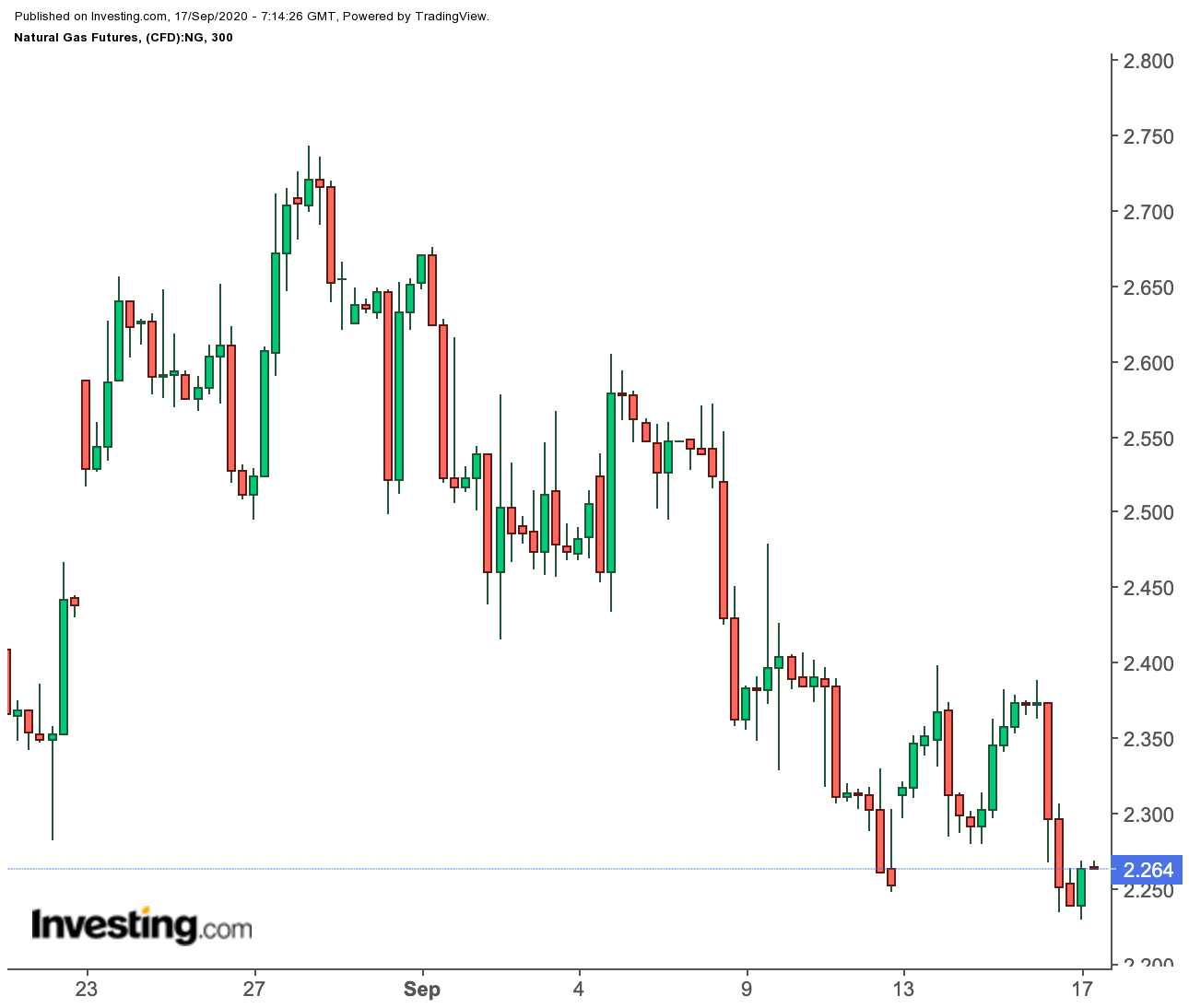The second Atlantic hurricane in three weeks has once again bolted the door on energy production in the U.S. Gulf Coast of Mexico.
Yet, Hurricane Sally, which made landfall on Wednesday near the Alabama/Florida border, hasn’t come quick enough to stop natural gas storage from showing another beefy stockpile addition for last week, that may put more weight on the fuel’s prices.
Gas traders expect the U.S. Energy Information Administration to report an injection of 79 billion cubic feet to its weekly data due at 10:30 AM (14:30 GMT) today. That will come after the previous week's addition of 70 bcf that ended ten straight weeks of relatively skinny builds ranging from 26-58 bcf.
Sally, the 18th named storm in the Atlantic this year, follows in the trail of Hurricane Laura, a Category 4 storm that struck Louisiana on April 27. It has shuttered 28% of gas output in the Gulf and 27% of oil production. Yet, as a Category 2 storm, its impact has been far less than that of Laura.
Little Storm Support Seen For Gas
Any price support for gas from Sally will be fleeting.
In Thursday’s electronic trade ahead of the regular session in New York, Henry Hub’s front-month October gas contract showed a loss of 0.7%, extending Wednesday’s unexpected tumble of 4.3%. The two day-loss has set the contract back nearly 1%, adding to the total drop of almost 15% over the past two weeks.
Chart-wise, October gas was emitting mixed calls, with a “Strong Buy” on the one and five minutes; “Buy” on the 15 minute, “Neutral” on the 30 minute, and “Strong Sell” on the hour and five-hour.

Investing.com’s “Classic” modeling shows that at Wednesday’s settlement of nearly $2.25 per mmBtu, Henry Hub’s benchmark gas contract appeared poised to test a baseline support of $2.047.
As naturalgasintel.com noted in a blog, the worst of the Sally’s ire, however, appeared to steer clear of the energy industry’s major offshore facilities. That left analysts to estimate that production could ramp back up as soon as this week, and that output declines could be more than offset by drops in demand imposed by power outages, evacuations and cool temperatures blown in by the hurricane.
While production in the Gulf Coast was “relatively flat” on Wednesday compared with the previous day, “some parts of the Gulf are now in the clear,” Genscape Inc.’s Anthony Ferrara told the blog. He added:
“Pipelines Garden Banks and Nautilus announced that personnel evacuated as a precaution ahead of the storm are returning to platforms as Sally has drifted further east compared to earlier estimates.”
Storage Injections Consistently Rising
Gelber & Associates, a Houston-based gas risk consultancy, concurred with that view. In an email to its clients, seen by investing.com, it said:
“Given that storage injections are consistently rising, heading into the winter months, as power demand begins to struggle, 2020 storage levels may challenge the record highs of 2016, which ended with almost 4.05 Tcf of natural gas.”
Anyone with illusions of a quick fix for energy demand need only listen to the Fed's comments earlier this week.
The central bank noted that U.S. industrial production rose a mere 0.4% in August, down from a 3.5% increase in July and a 6.1% increase in June. The gains followed April’s 12.9% pandemic-induced collapse.
On Wednesday, the U.S. central bank said it will likely keep interest rates at near zero for the next three years—an indication of how long it expects the fallout from the coronavirus crisis to last.
“For energy bulls,” the Fed’s latest assessment “was an abject disappointment,” according to The Schork Report, an energy newsletter. It said:
“Rumors of a V-shaped recovery are greatly exaggerated.”
Until recently, scorching summer heat had gas-fired power plants cranking to keep air conditioners running full blast. The onset of a cold winter will inject strong heating demand. But in the meantime, fall conditions are expected to hover between those two extremes, minimizing weather-driven demand.
Analysts, meanwhile, expect gas burns for power to drop steadily as fall-like temperatures are felt in swathes of the Lower 48 states’ eastern half and the daily need for air-conditioning declines.
Forecaster Natgas Weather said in a blog:
“A minor bump in national demand is expected late in the week as a cool shot over Southern (NYSE:SO) Canada provides a glancing blow to the Midwest and Northeast with lows dropping into the slightly chilly 40s.”
“High pressure is expected to regain ground this weekend and next week, with much of the United States quite comfortable with highs of 70s and 80s, besides portions of the hotter West, for light demand.”
Disclaimer: Barani Krishnan does not have a position in the commodities or securities he writes about.
